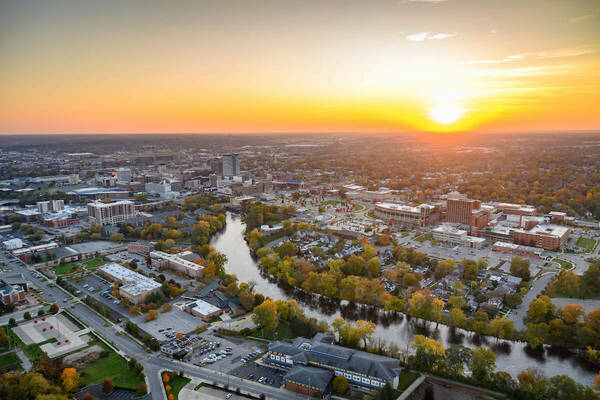
The Notre Dame–IBM Technology Ethics Lab announces the launch of the Ethical Cities Program. This community-focused research translation endeavor brings Notre Dame faculty and students together with local organizations to develop technology and policy solutions to real-world challenges in the South Bend region. Faculty investigators represent disciplines as diverse as economics, computer science, architecture, and civil engineering, and community partners include the City of South Bend, the St. Joseph River Basin Commission, and the Near Northwest Neighborhood. These projects, supported with $20,000 each, will be undertaken and completed in 2024.
“We’re incredibly excited to witness the projects under the Ethical Cities Program develop, investing in our excellent faculty members at Notre Dame and the collaborations with our regional partners,” says Nuno Moniz, Director of the Notre Dame–IBM Technology Ethics Lab. “This allows us to work together on the most challenging part of ethics and AI applications: How can we translate our knowledge into practice that has a sustained and positive impact in our communities?”
Heather Domin, Associate Director of the Lab and Global Leader of Responsible AI Initiatives at IBM, adds, “These projects also highlight the ability of AI to help address historical issues and regional disparity. By demonstrating ethical impact within local communities, we can help show how we might use AI to help address other disparities at a larger scale, such as those we see between the Global North and Global South.”
Alan Hamlet, Associate Professor, Civil and Environmental Engineering and Earth Sciences at Notre Dame, will partner with the St. Joseph River Basin Commission on a project focused on Bowman Creek. “Monitoring and modeling of streamflow and water quality in the Bowman Creek watershed provides wonderful hands-on training in hydrology for high school and undergraduate students, and experimentation and data analysis lead to a deeper understanding of how hydrologic processes and water quality in small watersheds are influenced by land use, vegetation, precipitation, groundwater contamination, and other factors,” says Hamlet. “Machine learning techniques, combined with automated monitoring of key drivers, can be used to evaluate alternatives designed to reduce environmental impacts, such as wetlands, green infrastructure, or alternative farming practices.”
Matt Meersman, director of the St. Joseph River Basin Commission, adds, “Understanding the value of green infrastructure and the benefits of nature-based solutions to water quality and quantity issues is complex and challenging for local governments. Collaborating with the Ethical Cities Program has introduced new minds to local natural resource concerns and brought new approaches to tackling historic problems with water management.”
The complete list of research teams includes:
-
Georgina Curto Rex (Lucy Family Institute for Data & Society) will collaborate with the City of South Bend’s Department of Innovation & Technology on an Ethical Procurement Guide for City Data Services
-
Yong Suk Lee (Keough School of Global Affairs) will collaborate with the City of South Bend’s Department of Innovation & Technology on GenAI vs. Procured Services: A Framework to Approach City Government Decisions
-
Valentina Kuskova (Lucy Family Institute for Data & Society) will collaborate with the City of South Bend’s Department of Innovation & Technology on an Exploration of Synthetic Data Use for Transparency
-
Alan Hamlet (Civil and Environmental Engineering and Earth Sciences) will collaborate with the St. Joseph River Basin Commission on Hydrologic and Water Quality Impact Study on Bowman Creek
-
Matthew Sisk (Lucy Family Institute for Data & Society) and Ming Hu (School of Architecture) will collaborate with the Near Northwest Neighborhood on Health and Environmental Risks in a South Bend Neighborhood
The Notre Dame–IBM Technology Ethics Lab, which is a key element of the Notre Dame Ethics Initiative, promotes broad-based, far-reaching interdisciplinary research, thought, and policy leadership in artificial intelligence and other technology ethics by engaging with relevant stakeholders to examine real-world challenges and provide practical models and applied solutions for ethical technology design, development, and deployment. The Lab is sponsored by IBM through a 10-year, $20-million investment.
